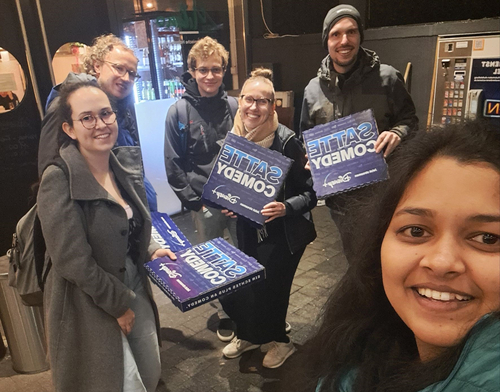Projects Offered
Roopesh Anand Petra Beli Petra Beli/Vassilis Roukos Dorothee Dormann René Ketting Katja Luck Carlotta Martelli Christof Niehrs_Ageing Christof Niehrs_Bioinfo Christof Niehrs_4R Sandra Schick Helle Ulrich Andreas Wachter Johannes Mayer_DCMem Johannes Mayer_DCSkin Wolfram Ruf Tim Sparwasser Uwe WolfrumTrained immunity of dendritic cells
1 PhD project offered in the IPP summer call Molecular Biomedicine & Ageing
Scientific Background
Trained immunity has recently been discovered as a novel mechanism of immune cell memory in innate immune cells. Different to the adaptive immune system, innate cells do not develop into antigen-specific long lived memory cells that can be reactivated. Instead it was found that epigenetic and metabolic changes in stem cells and progenitors are transmitting previous information (e.g. from prior infections) and change the general activation status of future generations of innate immune cells. Especially monocytes have been studied in the context of trained immunity, but other cell types like neutrophils and even epithelial cells contribute to trained immunity.
These changes provide a more effective response to similar threats in the future, linked to pattern recognition pathways and cytokine production. As this re-activation is not antigen specific, it can also be triggered in response to other stimuli, potentially leading to broader beneficial but also detrimental effects. While trained immunity is not as specific or long-lasting as adaptive immune memory it still provides a faster, more robust reaction upon re-exposure in a non-antigen specific context.
PhD project: Trained immunity of dendritic cells
In this PhD project we aim to study if dendritic cells also contribute to trained immunity in models of infection and inflammation. Dendritic cells play a fundamental role in antigen presentation and the priming of naive T cells. They are short lived and constantly replenished by stem cells within the bone marrow from where they are dispersed into tissues, to sample and recognize pathogens. Upon activation they rapidly migrate to the draining lymph nodes to activate T cells via antigen presentation, costimulatory marker expression and cytokine production. Several lineages of dendritic cells have been described, which perform enhanced roles for certain immune responses, as cDC1 preferentially control CD8 T cell responses via cross-presentation, while cDC2 are specialized in driving different T helper cell responses by producing key molecules for their differentiation.
To study if dendritic cells also play a role in trained immunity, we will establish murine models of recurring inflammation and re-infection and use different single-cell and omics approaches established in our lab to characterize and define the cellular, molecular and functional changes of dendritic cells. These changes will be carefully compared to monocytes, which have been well studied in trained immunity. Furthermore, phenotypes of trained immunity between different dendritic cell lineages will be assessed.
Due to their rapid activation and low frequency in tissues, the study of dendritic cells is challenging. Therefore this PhD requires a strong background in immunology, previous experience with complex phenotyping of immune cells by flow cytometry (10+ markers) and previous experience with murine models of inflammation or infection.
If you are interested in this project, please select Mayer (DCMem) as your project preference in the IPP application platform.
Publications relevant to this project
Mayer JU, Hilligan KL, Chandler JS, Eccles DA, Old SI, Domingues RG, Yang J, Webb GR, Munoz-Erazo L, Hyde EJ, Wakelin KA, Tang SC, Chappell SC, von Daake S, Brombacher F, Mackay CR, Sher A, Tussiwand R, Connor LM, Ortega DG, Jankovic D, Gros GL, Hepworth MR, Lamiable O, Ronchese F (2021) Homeostatic IL-13 in healthy skin directs dendritic cell differentiation to promote TH2 and inhibit TH17 cell polarization. Nat. Immunol., 1 (13). Link
Blank CU, Haining WN, Held W, Hogan PG, Kallies A, Lugli E, Lynn RC, Philip M, Rao A, Restifo NP, Schietinger A, Schumacher TN, Schwartzberg PL, Sharpe AH, Speiser DE, Wherry EJ, Youngblood BA, Zehn D. (2019) Defining 'T cell exhaustion'.Nat Rev Immunol. (11):665-674. Link
Bosteels C, Neyt K, Vanheerswynghels M, van Helden MJ, Sichien D, Debeuf N, De Prijck S, Bosteels V, Vandamme N, Martens L, Saeys Y, Louagie E, Lesage M, Williams DL, Tang SC, Mayer JU, Ronchese F, Scott CL, Hammad H, Guilliams M, Lambrecht BN. (2020) Inflammatory Type 2 CDCs Acquire Features of CDC1s and Macrophages to Orchestrate Immunity to Respiratory Virus Infection. Immunity, 52 (6), 1039-1056 e9. Link
Netea MG, Domínguez-Andrés J, Barreiro LB, Chavakis T, Divangahi M, Fuchs E, Joosten LAB, van der Meer JWM, Mhlanga MM, Mulder WJM, Riksen NP, Schlitzer A, Schultze JL, Stabell Benn C, Sun JC, Xavier RJ, Latz E. (2020) Defining trained immunity and its role in health and disease.Nat Rev Immunol. (6):375-388. Link
Contact Details
Prof. Dr Johannes Mayer
Email
Website UMC
Website Mayer Lab
